Related Research Articles
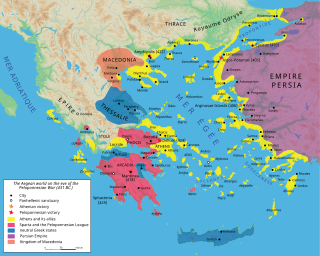
The Delian League was a confederacy of Greek city-states, numbering between 150 and 330, founded in 478 BC under the leadership (hegemony) of Athens, whose purpose was to continue fighting the Persian Empire after the Greek victory in the Battle of Plataea at the end of the Second Persian invasion of Greece. The League functioned as a dual –offensive and defensive– alliance (symmachia) of autonomous states, similar to its rival association, the Peloponnesian League. The League's modern name derives from its official meeting place, the island of Delos, where congresses were held within the sanctuary of the Temple of Apollo; contemporary authors referred to the organization simply as "the Athenians and their Allies".

The Second Peloponnesian War, often called simply the Peloponnesian War, was an ancient Greek war fought between Athens and Sparta and their respective allies for the hegemony of the Greek world. The war remained undecided until the later intervention of the Persian Empire in support of Sparta. Led by Lysander, the Spartan fleet finally defeated Athens which began a period of Spartan hegemony over Greece.
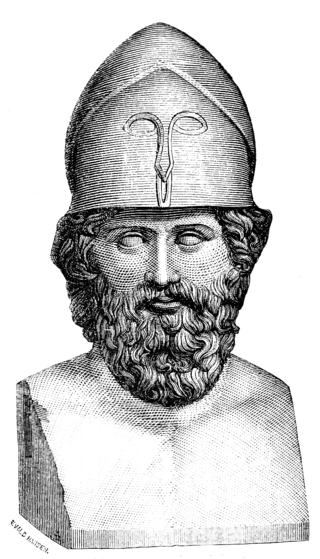
Themistocles was an Athenian politician and general. He was one of a new breed of non-aristocratic politicians who rose to prominence in the early years of the Athenian democracy. As a politician, Themistocles was a populist, having the support of lower-class Athenians, and generally being at odds with the Athenian nobility. Elected archon in 493 BC, he convinced the polis to increase the naval power of Athens, a recurring theme in his political career. During the first Persian invasion of Greece, he fought at the Battle of Marathon (490 BC), and may have been one of the ten Athenian strategoi (generals) in that battle.

The 5th century BC started the first day of 500 BC and ended the last day of 401 BC.
This article concerns the period 469 BC – 460 BC.
This article concerns the period 449 BC – 440 BC.

The King's Peace was a peace treaty guaranteed by the Persian King Artaxerxes II that ended the Corinthian War in ancient Greece. The treaty is also known as the Peace of Antalcidas, after Antalcidas, the Spartan diplomat who traveled to Susa to negotiate the terms of the treaty with the king of Achaemenid Persia. The treaty was more commonly known in antiquity, however, as the King's Peace, a name that reflects the depth of Persian influence in the treaty, as Persian gold had driven the preceding war. The treaty was a form of Common Peace, similar to the Thirty Years' Peace which ended the First Peloponnesian War.
Megabyzus was an Achaemenid Persian general, son of Zopyrus, satrap of Babylonia, and grandson of Megabyzus I, one of the seven conspirators who had put Darius I on the throne. His father was killed when the satrapy rebelled in 484 BCE, and Megabyzus led the forces that recaptured the city, after which the statue of the god Marduk was destroyed to prevent future revolts. Megabyzus subsequently took part in the Second Persian invasion of Greece. Herodotus claims that he refused to act on orders to pillage Delphi, but it is doubtful such orders were ever given.
Artabazos was a Persian general in the army of Xerxes I, and later satrap of Hellespontine Phrygia under the Achaemenid dynasty, founder of the Pharnacid dynasty of satraps. He was the son of Pharnaces, who was the younger brother of Hystaspes, father of Darius I. Artabazos was therefore a first cousin of the great Achaemenid ruler Darius I.
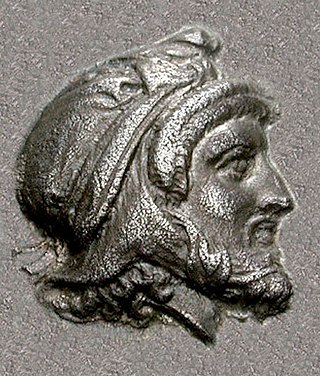
Pharnabazus II was a Persian soldier and statesman, and Satrap of Hellespontine Phrygia. He was the son of Pharnaces II of Phrygia and grandson of Pharnabazus I, and great-grandson of Artabazus I. He and his male ancestors, forming the Pharnacid dynasty, had governed the satrapy of Hellespontine Phrygia from its headquarters at Dascylium since 478 BC. He married Apama, daughter of Artaxerxes II of Persia, and their son Artabazus also became a satrap of Phrygia. According to some accounts, his granddaughter Barsine may have become Alexander the Great's concubine.

The Greco-Persian Wars were a series of conflicts between the Achaemenid Empire and Greek city-states that started in 499 BC and lasted until 449 BC. The collision between the fractious political world of the Greeks and the enormous empire of the Persians began when Cyrus the Great conquered the Greek-inhabited region of Ionia in 547 BC. Struggling to control the independent-minded cities of Ionia, the Persians appointed tyrants to rule each of them. This would prove to be the source of much trouble for the Greeks and Persians alike.

Pausanias was a Spartan regent and a general. In 479 BC, as a leader of the Hellenic League's combined land forces, he won a pivotal victory against the Achaemenid Empire in the Battle of Plataea. Despite his role in ending the Second Persian invasion of Greece, Pausanias subsequently fell under suspicion of conspiring with the Persian king Xerxes I. After an interval of repeated arrests and debates about his guilt, he was starved to death by his fellow Spartans. What is known of his life is largely according to Thucydides' History of the Peloponnesian War, Diodorus' Bibliotheca historica and a handful of other classical sources.
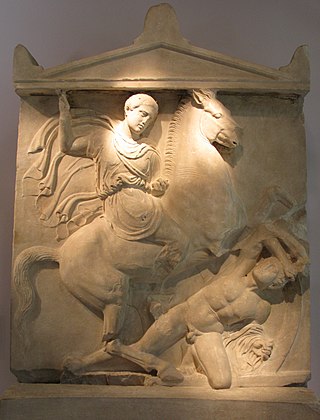
The Corinthian War was a conflict in ancient Greece which pitted Sparta against a coalition of city-states comprising Thebes, Athens, Corinth and Argos, backed by the Achaemenid Empire. The war was caused by dissatisfaction with Spartan imperialism in the aftermath of the Peloponnesian War, both from Athens, the defeated side in that conflict, and from Sparta's former allies, Corinth and Thebes, who had not been properly rewarded. Taking advantage of the fact that the Spartan king Agesilaus II was away campaigning in Asia against the Achaemenid Empire, Thebes, Athens, Corinth and Argos forged an alliance in 395 BC with the goal of ending Spartan hegemony over Greece; the allies' war council was located in Corinth, which gave its name to the war. By the end of the conflict, the allies had failed to end Spartan hegemony over Greece, although Sparta was weakened by the war.
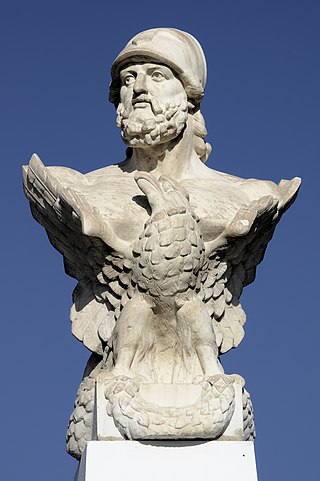
Cimon or Kimon was an Athenian strategos and politician.

Pentecontaetia is the term used to refer to the period in Ancient Greek history between the defeat of the second Persian invasion of Greece at Plataea in 479 BC and the beginning of the Peloponnesian War in 431 BC. The term originated with a scholiast commenting on Thucydides, who used it in their description of the period. The Pentecontaetia was marked by the rise of Athens as the dominant state in the Greek world and by the rise of Athenian democracy, a period also known as Golden Age of Athens. Since Thucydides focused his account on these developments, the term is generally used when discussing developments in and involving Athens.
The First Peloponnesian War was fought between Sparta as the leaders of the Peloponnesian League and Sparta's other allies, most notably Thebes, and the Delian League led by Athens with support from Argos. This war consisted of a series of conflicts and minor wars, such as the Second Sacred War. There were several causes for the war including the building of the Athenian long walls, Megara's defection and the envy and concern felt by Sparta at the growth of the Athenian Empire.

Classical Greece was a period of around 200 years in ancient Greece, marked by much of the eastern Aegean and northern regions of Greek culture gaining increased autonomy from the Persian Empire; the peak flourishing of democratic Athens; the First and Second Peloponnesian Wars; the Spartan and then Theban hegemonies; and the expansion of Macedonia under Philip II. Much of the early defining mathematics, science, artistic thought, theatre, literature, philosophy, and politics of Western civilization derives from this period of Greek history, which had a powerful influence on the later Roman Empire. Part of the broader era of classical antiquity, the classical Greek era ended after Philip II's unification of most of the Greek world against the common enemy of the Persian Empire, which was conquered within 13 years during the wars of Alexander the Great, Philip's son.
The period of the 5th century BC in classical Greece is generally considered as beginning in 500 BC and ending in 404 BC, though this is debated. This century is essentially studied from the Athenian viewpoint, since Athens has left more narratives, plays and other written works than the other Greek states. If one looks at Athens, our principal source, one might consider that this century begins in 510 BC, with the fall of the Athenian tyrant and Cleisthenes's reforms. If one looks at the whole Greek world, however, we might place its beginning at the Ionian Revolt in 500 BC, that provoked the first Persian invasion of 492 BC. The Persians were finally defeated in 490 BC. A second Persian attempt failed in 480–479 BC. The Delian League then formed, under Athenian hegemony and as Athens' instrument. Athens' excesses caused several revolts among the allied cities, which were all put down by force, but Athenian dynamism finally awoke Sparta and brought about the Peloponnesian War in 431 BC. After both sides were exhausted, a brief peace occurred, and then the war resumed to Sparta's advantage. Athens was definitively defeated in 404 BC, and some internal Athenian agitations ended the 5th century in Greece.

The Battle of the Eurymedon was a double battle, taking place both on water and land, between the Delian League of Athens and her Allies, and the Persian Empire of Xerxes I. It took place in either 469 or 466 BCE, in the vicinity of the mouth of the Eurymedon River in Pamphylia, Asia Minor. It forms part of the Wars of the Delian League, itself part of the larger Greco-Persian Wars.
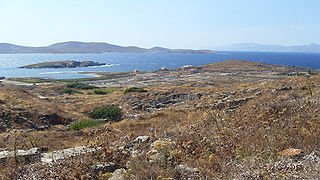
The Wars of the Delian League were a series of campaigns fought between the Delian League of Athens and her allies, and the Achaemenid Empire of Persia. These conflicts represent a continuation of the Greco-Persian Wars, after the Ionian Revolt and the first and second Persian invasions of Greece.
